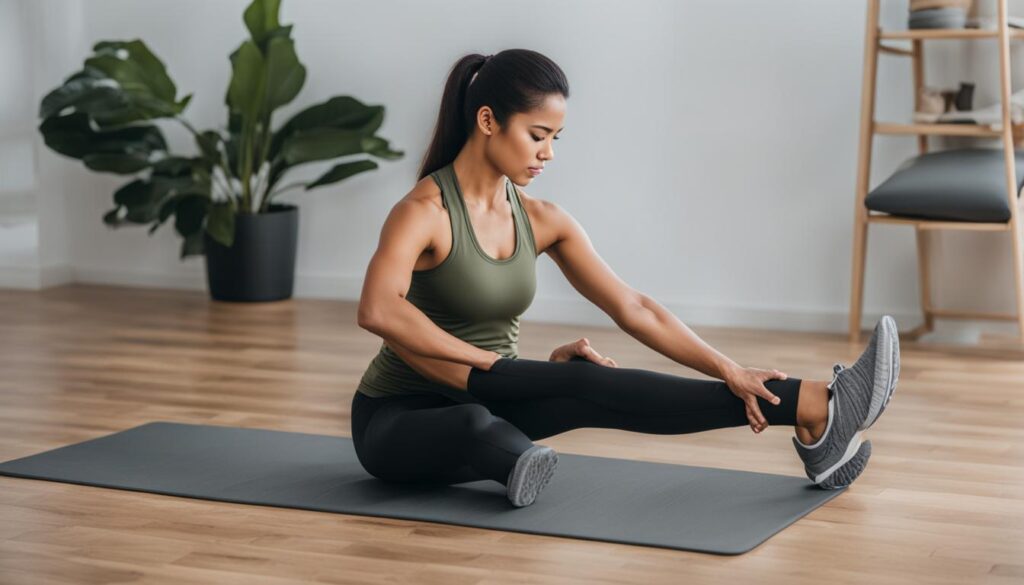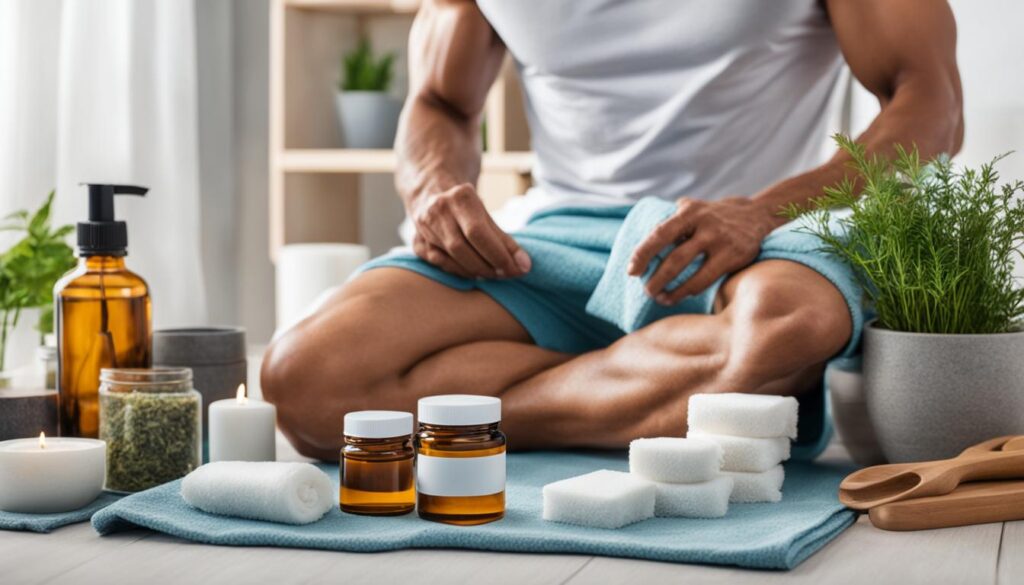If you’ve ever experienced an unexpected twitch in your calf, a sudden cramp in your foot, or an uncomfortable tightening in your back, you’re likely familiar with the discomfort associated with muscle spasms. These involuntary muscle contractions can range from a mild annoyance to a debilitating pain that disrupts daily activities. While muscle spasms can affect individuals across all walks of life, the good news is you can often find relief right in your own home. Discover effective muscle spasm home remedies and learn about the natural ways to relieve muscle spasms.
Home treatments for easing muscle spasms naturally can provide immediate solace. From stretching exercises targeted to specific muscle groups to massage therapies, there is a myriad of ways to manage discomfort. Natural muscle relaxants and over-the-counter nonprescription remedies can also offer significant relief for those who experience recurrent or severe spasms.
Key Takeaways
- Muscle spasms can cause discomfort ranging from a minor annoyance to debilitating pain.
- Stretching and massage therapies are common home remedies to relieve muscle spasms.
- Natural muscle relaxants can offer substantial relief for those experiencing repeated or severe spasms.
- Over-the-counter nonprescription drugs can also be used on a case-by-case basis for muscle spasm relief.
- Proper hydration and nutrients intake is essential to prevent and mitigate muscle spasms.
- Severe or recurrent spasms may require medical consultation and professional treatments.
Understanding Muscle Spasms: Causes and Symptoms
If we aim to find natural remedies for muscle spasms, gaining some knowledge about muscle spasms and their causes can be extremely helpful. Start by understanding that they can be derived from a multitude of sources, including lifestyle factors as well as certain medical conditions. Recognizing what leads to muscle cramps and knowing the symptoms can aid in reducing muscle spasms and seeking the right muscle spasm treatment.
What Causes Muscle Spasms?
Muscle spasms can derive from factors as common as muscle fatigue or more severe scenarios related to medical conditions. It’s important to remember that anything from pregnancy and strain owing to repetitive activity, to underlying health issues like diabetes or Parkinson’s disease can trigger involuntary muscle contractions. Additionally, some medications including statins, diuretics, and corticosteroids, are known to cause muscle cramps.
Recognizing the Signs of Muscle Spasms
Cramps can manifest as a sudden, sharp pain, accompanied by the hardening of the affected muscle. Most muscle spasms are fleeting, but they may also last a few minutes or recur multiple times before subsiding. Following the contraction, the muscle may still feel sore and tender. Anyone experiencing regular and severe spasms should seek professional medical attention.
The Impact of Dehydration and Nutrient Deficiency
Fluid and electrolyte balance play a significant role in muscle functionality. Dehydration and electrolyte depletion can lead to insufficient reduction of the muscle’s electrical activity, which often results in a muscle spasm. Apart from water loss, not getting enough of certain nutrients, particularly calcium, magnesium, potassium, and sodium, could trigger muscle cramps.
As numerous factors contribute to spasms, muscle spasm relief is not universally standardized and reflects the diverse causes. However, maintaining optimum hydration and nutrient levels often proves beneficial in preventing and reducing muscle spasms.
Natural Remedies to Alleviate Muscle Cramps

When it comes to alleviating muscle cramps, several natural muscle relaxants can prove beneficial. Incorporating them into your routine can play a major role in reducing discomfort and speeding up the recovery process.
Consider the humble cherry. Packed with antioxidants, cherries and tart cherry juice can help decrease pain resulting from exercise-induced muscle damage. Similarly, other antioxidant-rich fruits like blueberries and pomegranates provide anti-inflammatory benefits conducive to muscle recovery.
Consuming an adequate amount of protein after physical exertion is crucial. Protein aids in reducing muscle inflammation and supporting overall muscle health. Also, be sure to include foods high in magnesium in your diet, like spinach, avocados, and bananas, to ensure proper muscle function.
Natural compounds found in everyday spices can offer relief too. Curcumin, found in turmeric, ginger, and cinnamon, may help reduce inflammation post-exercise. Similarly, arnica, a flower known for its medicinal properties, can help soothe muscle soreness.
For topical treatments, look no further than capsaicin, the compound that gives chili peppers their heat. Capsaicin creams have shown promise in offering pain relief by reducing the pain signals sent to your brain.
Furthermore, CBD oil and essential oils like peppermint oil and lemongrass oil have earned a reputation for their potential muscle-relaxing properties. Rich in anti-inflammatory agents like delta-limonene and beta-myrcene, CBD oil may help soothe muscle strains.
While these remedies can aid in reducing muscle discomfort, it’s essential to consult with health care providers before introducing new treatments to your routine. Being aware of these natural muscle relaxants is a step in the right direction for optimal muscle health.
Relieving Muscle Spasms Naturally Through Stretching
The notion of muscle spasm remedies is significantly pivoted around the idea of stretching exercises. Such routines not only deliver immediate results in managing existing spasms, but their regular implementation can also aid in preventing such painful contractions in the future. By fostering better muscle elasticity and circulation, daily stretching routines can emerge as a reliable, natural method to counter muscle spasms in various regions, including calf, thigh, back, and neck.

Targeted Stretches for Different Muscle Groups
Not every muscle spasm can be addressed with the same stretch. Specific stretches target different muscle groups effectively. For instance, if you experience calf muscle spasms, lying down and performing dorsiflexion – drawing your toes towards your head – can provide relief. Thigh spasms, on the other hand, can be alleviated with a standing quadricep stretch, where you pull your foot up towards your buttocks.
Back spasms often respond well to gentle walking and the use of props like tennis balls and foam rollers. These tools apply pressure and increase mobility, helping to ease the spasm. When dealing with neck spasms, shoulder rolls performed in both directions can be immensely beneficial.
Incorporating Daily Stretching Routines
Including a regimen of daily stretching exercises in your routine can help preempt muscle spasms. Regular practice not only improves muscle flexibility but also enhances blood circulation to the musculature. Endorsing such habits develops better musculoskeletal health and resilience against painful muscle contractions.
| Muscle Group | Recommended Stretches |
|---|---|
| Calf muscles | Lie down and perform dorsiflexion |
| Thigh muscles | Standing quadricep stretch |
| Back muscles | Walking and use of props like tennis balls and foam rollers |
| Neck muscles | Shoulder rolls in both directions |
By embracing a muscle-friendly lifestyle that champions the right stretches, hydration, and nutrition, muscle spasms can be effectively managed. And, fitness enthusiasts and individuals who lead an active life will find a significant drop in muscle discomfort, enhancing their ability to enjoy a healthy, physical lifestyle free from the constraints of muscle spasms.
Hydration and Nutrition: Key Components for Muscle Health
Proper hydration and balanced nutrition are fundamental for overall muscle health and in reducing muscle spasms. This is particularly important for active individuals or those who are prone to bouts of muscle contractions due to particular health conditions or lifestyle factors. But what underlies the role of water and nutrition in muscle function? How do they contribute to muscle recovery post-exertion? Let’s explore.
The Role of Water in Muscle Function
Water intake for muscle health cannot be overemphasized. Hydration plays a significant role in a myriad of body functions, including metabolizing nutrients, maintaining optimal body temperature and ensuring smooth muscle contractions. Notably, sufficient water intake assists our body in averting muscle cramps or spasms that can transpire due to dehydration, especially during prolonged periods of strenuous exercise or hot weather. Water requirements can vary according to individual needs and lifestyle, hence it’s imperative to listen to your body’s signs of thirst and adequately hydrate before, during and after physical exertion.
Essential Nutrients and Minerals for Muscle Recovery
Beyond hydration, certain key nutrients and minerals boost our muscle recovery process and help avert spasms. Preeminent among them are magnesium supplements. Magnesium, naturally found in foods such as almonds, spinach, and black beans, aids muscle contractions and accelerates recovery following strenuous physical activity. Additionally, vitamins like B-12 and electrolytes such as sodium and potassium are essential in muscle upkeep, preventing cramps and fostering speedy muscle recovery. To ensure muscle health, it’s crucial to not only adhere to adequate hydration protocols but also important to not overlook the role of a balanced diet rich in vital nutrients and minerals.





